- Home
- Melissa Marr
Ink Exchange Page 3
Ink Exchange Read online
Page 3
He stepped closer, pushing off the redbrick wall where he’d been leaning while she was in the tattoo shop. As she paused to survey the shadows in the street, Niall brushed his fingers over a lock of her hair that’d fallen forward over her cheek. Her hair—almost as wood brown as his own—wasn’t long enough to tie back or short enough to stay back on its own, just right to be intriguing.
Like she is.
His fingers barely grazed her cheek, not enough for her to react. He leaned closer so he could smell her skin. Before work, she had a lavender scent, not perfume, but the shampoo she favored lately. “What are you doing out alone again? You know better.”
She didn’t answer him. She never did: mortals didn’t see faeries, didn’t hear them—especially mortals the Summer Queen had insisted be kept unaware of the Faery Courts.
Initially, at his king’s request, Niall had taken a few of the shifts guarding Leslie. When she was unaware, he could walk beside her and talk to her as he couldn’t when he was visible to her. The way the mortal girl looked at him—like he was better than he’d ever been, like he was attractive because of who he was, not because of his role in the Summer Court—was a heady thing, too much so, in truth.
If his queen hadn’t asked it, Niall still would’ve wanted to keep Leslie safe. But Aislinn did order it. Unlike Leslie, when Aislinn had been mortal, she’d seen the ugliness of the faery world. Since becoming the Summer Queen she’d worked to find a balance with the equally new Winter Queen. It didn’t leave a lot of time for keeping her mortal friends safe, but it did give her the power to order faeries to assure the mortals’ safety. Such a task would not normally be handled by a court advisor, but Niall had been more family than mere advisor to the Summer King for centuries. Keenan suggested that Aislinn would feel better knowing that her closest friends’ safety was under the direction of a faery she trusted.
Although it had been only a few shifts at first, more and more, Niall took extra duty watching over her. He hadn’t done so with the others, but they didn’t fascinate him as Leslie did. Leslie vacillated between vulnerable and bold, fierce and frightened. Once, when he had collected mortals for playthings, she would’ve been irresistible, but he was stronger now.
Better.
He forced away that line of thought and watched the sway of Leslie’s hips as she walked through the streets of Huntsdale with a courage—foolishness—that ran counter to what he knew of her experiences. Maybe she’d go home if home were any safer. It wasn’t. He’d seen that the first time he’d stood waiting on her front step, heard her drunken father, her vile brother. Her home might look charming from the outside, but that was a lie.
Like so much of her life.
He glanced down at the heelless shoes she had on, at her bare calves, at her long legs. The unexpectedly early start of summer this year—after ages of oppressive cold—was leading to mortals exposing more skin. Looking at Leslie, Niall wasn’t complaining. “At least you have decent shoes tonight. I couldn’t believe you went to work in those dainty little things the other night.” He shook his head. “They were lovely, though. Well, really, I just liked the glimpse of your ankles.”
She headed to the restaurant, where she would put on her fake smile and flirt with the customers. He’d see her to the door; then he’d wait outside, watching the bodies that came and went, making sure they didn’t mean her harm. It was the routine.
Sometimes he let himself imagine how things would be if she could truly know him—see him in a true light. Would her eyes widen in fear if she saw the extent of his scars? Would her face crumple in disgust if she knew the horrible things he’d done before he belonged to the Summer Court? Would she ask why he kept his hair shorn? And if she asked, could he answer any of those questions?
“Would you run from me?” he asked in a low voice, hating the fact that his heart sped at the thought of pursuing a mortal girl.
Leslie paused as a group of young men catcalled from their car. One of them hung halfway out the window, displaying his vulgarity as if it made him a man. Niall doubted that she could hear their words: the bass in their car was too loud for mere voices to compete with. Actual words weren’t necessary to know threat. Leslie tensed.
The car sped away, the rumbling bass fading like thunder from a passing storm.
He whispered against her ear, “They’re just children, Leslie. Come now. Where’s that spring in your step?”
Her breathy sigh was soft enough that he would have missed it if he hadn’t been standing very close. A little of the tension eased from her shoulders, but the drawn look stayed on her face. It never seemed to fade. Her makeup didn’t hide the shadows under her eyes. Her long sleeves didn’t hide the purpling bruises from her brother’s angry strikes the other day.
If I could step in…
But he couldn’t, not into her life, not into her home. That was forbidden to him. All he could do was offer her his words—words she couldn’t hear. He still said, “I’d stop anyone from taking that smile from you. I would, if I were allowed.”
Absently, she put one hand on her back and glanced in the direction of Pins and Needles. She smiled to herself, the same smile she’d worn when she left the tattoo parlor.
“Aaah, you’ve finally decided to decorate that pretty skin. What will it be? Flowers? Sun?” He let his gaze drift up her spine.
She paused; they’d reached the restaurant. Her shoulders sagged again.
He wanted to comfort her, but instead he could only give her his nightly promise, “I’ll wait right here.”
He wished she’d answer, tell him she’d look for him after work, but she wouldn’t.
And it’s better this way. He knew it, but he didn’t like it. He’d been a part of the Summer Court long enough that his original path was almost forgotten, but watching Leslie—seeing her spirit, her passion…Once, when he’d been a solitary fey, when he’d had another name, there’d have been no hesitating.
“I agree with Aislinn, though. I want you kept safe,” he whispered in her ear. Her soft, soft hair brushed against his face. “I will keep you safe—from them and from me.”
CHAPTER 3
Irial stood in the early morning light, silent, one of his faeries lying dead at his feet. The faery, Guin, had worn a mortal guise so often that bits of her glamour still clung to her after death—leaving part of her face painted with mortal makeup and part gloriously other. She had on tight blue denims—jeans, she and her sisters always reminded him when they spoke—and a top that barely covered her chest. That slip of cloth was soaked with blood, her blood, fey blood, spilling onto the dirty ground.
“Why? Why did this happen, a ghrá?” Irial bent down to brush her bloody hair from her face. Around her were bottles, cigarette butts, and used needles. None of these offended him the way they once had: this area was rough, grown more violent these past years as the mortals settled their territorial disputes. What offended him was the notion that a mortal bullet had taken one of his own. It might not have been intentional, but that changed nothing. She was still fallen.
Across from him waited the tall, thin beansidhe who’d summoned him. “What do we do?” She wrung her hands as she spoke, resisting her natural instinct to wail. She wouldn’t resist for long, but Irial didn’t—couldn’t—answer yet.
He picked up an empty casing, turning it over in his fingers. The brass shouldn’t hurt a fey, nor should the lead slug that he’d removed from the dead faery’s body when he arrived. It had, though: a simple mortal bullet had killed her.
“Irial?” The beansidhe had bitten her tongue until blood seeped from her lips to drip down her pointed chin.
“Ordinary bullets,” he murmured, turning the bits of metal over in his fingers. In all the years since mortals had begun fashioning the things, he’d never seen one of his own dead from them. Shot, yes, but they had healed. They’d always healed from most everything mortals inflicted—everything but severe wounds made by steel or iron.
“Go home and w
ail. When the others come to you, tell them this area is off limits for now.” Then he lifted the bloodied faery into his arms and walked away, leaving the beansidhe to begin keening as she ran. Her cries would summon them, his now-vulnerable Dark Court faeries, bring them to hear the awful word that a mortal had killed a faery.
By the time the current Gabriel—Irial’s left hand—approached mere moments later, Irial’s winged shadow had spread like a pall over the street. His ink-black tears dripped onto Guin’s body, wiping away the glamour that still clung to her. “I’ve waited long enough to address the threat of the Summer Court’s growing strength,” he said.
“Waited too long,” Gabriel said. “Keep waiting and war comes on their terms, Iri.”
Like his predecessors, this Gabriel—for the name was one of rank, not birth—had always been blunt. It was an invaluable trait.
“I’m not seeking war in the courts, just chaos.” Irial paused at the stoop of a heavily shuttered house, one of the many such houses he kept for his faeries in whichever cities they called home. He stared at the house, the home where Guin would be laid out for the court’s mourning. Soon, Bananach would hear the news of Guin’s death; the war-hungry faery would begin her interminable machinations. Irial was not looking forward to trying to placate Bananach. She grew less patient by the year, pressing for more violence, more blood, more destruction.
“War is not what’s best for our court,” Irial said, as much to himself as to Gabriel. “That’s Bananach’s agenda, not mine.”
“If it’s not yours, it’s not the Hounds’, either.” Gabriel reached out and brushed Guin’s cheek. “Guin would agree. She wouldn’t support Bananach, even now.”
Three dark fey came out of the house; smoky haze clung to them as if it seeped from their skin. Mute, they took Guin’s body and carried her inside. From the open door, Irial could see that they’d already begun hanging black mirrors throughout his house, covering every available surface in the hopes that some lingering darkness would find its way home to the body, that some trace would be strong enough to come back to the empty shell, so Guin could be nurtured and heal. It wouldn’t: she was truly gone.
Irial saw them in his street, filthy mortals with so much lovely violence he couldn’t reach. That will change. “Find them, the ones who did this. Kill them.”
The previously blank space around the oghams on Gabriel’s forearm filled with scrolling script in recognition of the Dark King’s command. Gabriel always carried out the king’s orders with the intent plainly writ on his skin—to intimidate and to make clear that the king willed it.
“And send the others to bring some of Keenan’s fey for the wake. Donia’s too.” Irial grinned at the thought of sullen Winter Court faeries. “Hell, bring some of Sorcha’s reclusive faeries if you can find them. Her High Court’s not good for anything else. I’ll not sanction a war, but let’s start a few fights.”
At nightfall Irial sat on his dais looking out at his grieving faeries. They squirmed, paced, and wailed. The glaistigs were dripping dirty river water all over the floor; several beansidhes still keened. The Gabriel Hounds—in their human guise, skin decorated with moving ink and silver chains—joked amongst themselves, but there were under-currents of alarm. Jenny Greenteeth and her kin stared at everyone with accusing eyes. Only the thistle-fey seemed calm, taking advantage of the fear of the others, nourishing themselves on the panic that pervaded the room. They all knew that the rumblings of upheaval had already begun. With the reality of a faery death, the inducement to resort to extreme measures was inevitable. There were always factions, murmurs of mutiny: that was status quo. This was different: one of their own had died. That changed the stakes.
“Move away from the streets”—Irial let his gaze slide over them, assessing the signs of disagreement, determining who would sway toward Bananach when she began rallying them to her cause—“until we know how weakened we are.”
“Kill the new queen. Both of ’em,” one of the Hounds growled. “Summer King too if we need.”
The other Hounds took up the cry. The Ly Ergs rubbed their bloodred hands together in glee. Several of Jenny’s kin grinned and nodded. Bananach sat silently among them; her voice wasn’t ever necessary to know her preference. Violence was her sole passion. She tilted her head in her avian way, not doing anything other than watching. Irial smiled at her. She opened and closed her mouth with an audible snap, as if she’d bite him. She made no other movement. They both knew she disapproved of his plans; they both knew she’d test him. Again. If she could, she’d kill him to set the court into discord, but Dark Court faeries could not kill their regents.
The snarls grew deafening until Gabriel held a hand up for silence. When the rest of the room quieted, Gabriel flashed a menacing smile. “Your king speaks. You will obey him.”
No one objected when Gabriel snarled. After he’d slaughtered one of his own brethren for disrespecting Irial so many years ago, few ever challenged his will. If Gabriel had the political grace to go with the violence, Irial would try to cede the throne to him. In all the centuries Irial’d looked for his replacement, he’d only found one faery fit to lead them, but that faery had rejected the throne to serve another. Irial shoved that thought away. He was still responsible for the Dark Court, and considering what might have been didn’t help.
He said, “We are not strong enough to fight one court, much less two or three working together. Can any of you truly tell me that the kingling and the new Winter Queen wouldn’t work together? Can you tell me that Sorcha wouldn’t side with anyone”—he paused and smiled at Bananach—“most anyone who opposed me? War is not the right path.”
He didn’t add that he had no desire for true war. It would look like weakness, and a weak king wouldn’t hold his court very long. If there had been someone who could lead the court without destroying them all in unrestrained excess, Irial would step away, but the head of the Dark Court was chosen from among the solitary faeries for good reason. He enjoyed the pleasure of the shadows, but he understood that shadows needed light. Most of his court had trouble remembering that—or perhaps they never knew it. They certainly wouldn’t appreciate hearing it now.
The Dark Court needed the nourishment of the finer emotions: fear, lust, rage, greed, gluttony, and the like. Under the last Winter Queen’s cruel regime—before the newly empowered Summer King had come into his strength—the very air had been sustaining. Beira had been a malicious queen, inflicting as much agony on her own faeries as on those who dared to not kneel to her. It had been relaxing, if not always pleasant.
Irial said only, “Smaller conflicts can create the energy we need for sustenance. There are plenty of faeries you can use for nourishment.”
In a voice that would disturb the calmest of the winter fey, one of Jenny’s kin asked, “So we just feed on whatever random faeries we can find like nothing’s happened? I say we—”
Gabriel growled at her. “We will obey our king.”
Bananach snapped her mouth again; she tapped her talon-tipped fingers on the surface of the table. “So the Dark King is unwilling to fight? To allow us to defend ourselves? To strengthen ourselves? Just wait until we get weaker still? There’s an…interesting plan.”
She’s going to be true trouble this time.
Another green-toothed fey added, “If we fight, maybe some of us might fade, but the rest…a war’s apt to be good fun, my king.”
“No,” Irial said, glancing at Chela, Gabriel’s sometimes mate. “No war right now. I’ll not have any of you fade. That’s not an option. I will find a way.” He wished he could explain it to them in a way they’d understand. He couldn’t.
“Chela, love? Would you?” Irial inclined his head toward a group of faeries who’d been smiling and agreeing with the green-toothed fey. Talk of disobeying him was intolerable, especially when mutiny was simmering in Bananach’s eyes again.
Irial lit another cigarette and waited as Chela sauntered across the room. The knotwork hounds
on her biceps snapped at each other as they ran around her arm at a blurring pace. A soft hum emanated from her, somewhere between a growl and a contented murmur. As she approached the table, she grabbed a chair from one of the thistle-fey, dumping him to the floor as she lifted it and settled amidst the grumbling faeries.
Several other Hounds dispersed throughout the crowd. Gabriel had spoken, said that they’d support the Dark King: they’d either need to obey Gabriel or kill him. Had he allied with Bananach, a faery war would be unavoidable, but Gabriel had stood with Irial for as long as he’d held leadership of the Hounds.
Irial resumed: “A mortal has chosen my symbol for her tattoo. She’ll be bound to me within days. Through her, I will be able to feed on mortals and faeries both; I’ll offset your own feeding until we have another option.”
They didn’t react for a moment. Then they lifted their voices in a beautiful cacophony.
He’d never funneled his nourishment out to them, but he’d never needed to, either. He could. The head of a court was tied to each faery who swore fealty to him. His strength gave them strength; it was simply the way of things. It wasn’t a permanent solution, but it would keep them alive until a better solution was in reach—one that wasn’t full-out war.
He exhaled, watching the smoke writhe in the air, missing the dead queen, hating Keenan for defeating her, and wondering what it would take to entice Donia, the new Winter Queen, to become as ruthless as her predecessor. The alliance between Keenan and Donia had swung the balance too far toward a degree of peace that was detrimental to the Dark Court—but war wasn’t the answer either. The Dark Court couldn’t survive on violence alone, any more than terror or lust would be enough. Everything was about balance, and in a court where the darker emotions were sustenance, attending to that balance was essential.
Another squabble in the middle of the room caught his attention. Gabriel’s growl shook the walls as he ground his boot into a Ly Erg’s face, leaving the fallen faery bloody enough that there’d be another stain on the floor. Obviously, the Ly Ergs weren’t being as cooperative as Gabriel would like. They enjoyed bloodshed too much, clustering to support Bananach every time she stirred mutiny.

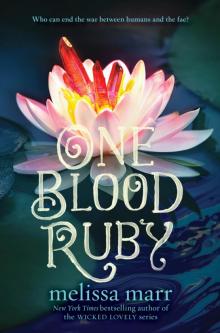 One Blood Ruby
One Blood Ruby Desert Tales
Desert Tales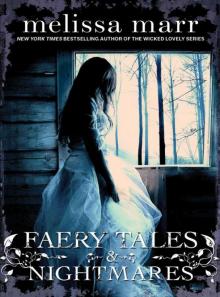 Faery Tales & Nightmares
Faery Tales & Nightmares Enthralled: Paranormal Diversions
Enthralled: Paranormal Diversions Wicked Lovely
Wicked Lovely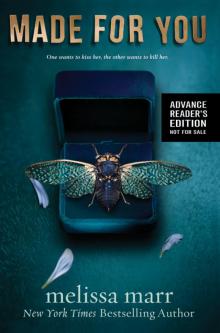 Made for You
Made for You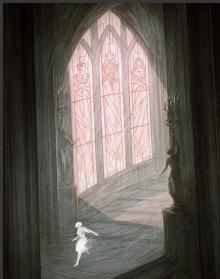 The Maiden Thief
The Maiden Thief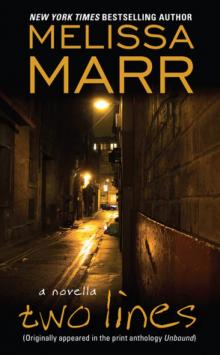 Two Lines
Two Lines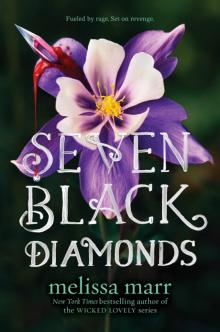 Seven Black Diamonds
Seven Black Diamonds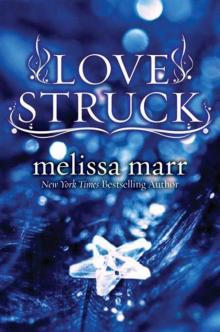 Love Struck
Love Struck Guns for the Dead
Guns for the Dead Radiant Shadows
Radiant Shadows Ink Exchange
Ink Exchange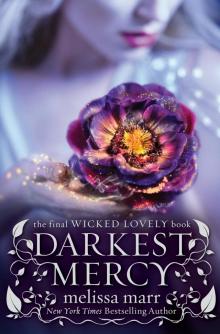 Darkest Mercy
Darkest Mercy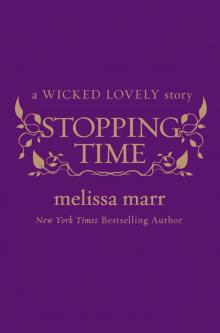 Stopping Time and Old Habits
Stopping Time and Old Habits Carnival of Secrets
Carnival of Secrets Carnival of Lies
Carnival of Lies This Fond Madness
This Fond Madness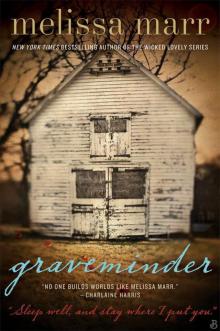 Graveminder
Graveminder The Arrivals
The Arrivals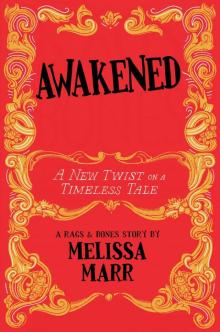 Awakened: A New Twist on a Timeless Tale
Awakened: A New Twist on a Timeless Tale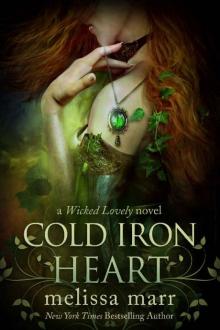 Cold Iron Heart: A Wicked Lovely Novel
Cold Iron Heart: A Wicked Lovely Novel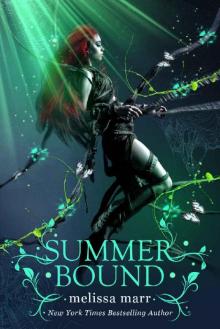 Summer Bound: A Wicked Lovely Story
Summer Bound: A Wicked Lovely Story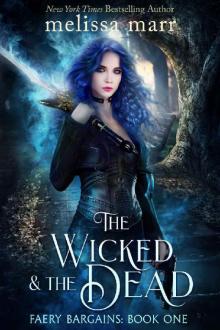 The Wicked & The Dead (Faery Bargains Book 1)
The Wicked & The Dead (Faery Bargains Book 1)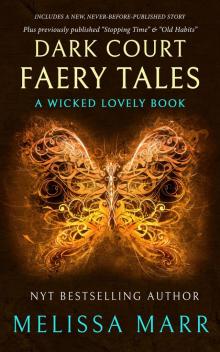 Dark Court Faery Tales
Dark Court Faery Tales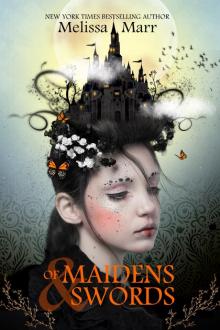 of Maidens & Swords
of Maidens & Swords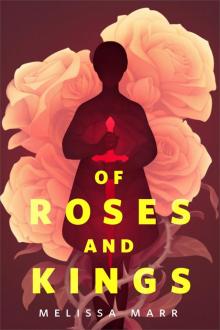 Of Roses and Kings
Of Roses and Kings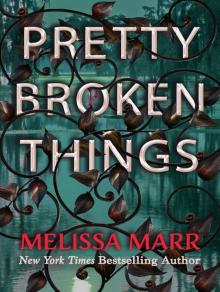 Pretty Broken Things
Pretty Broken Things Enthralled
Enthralled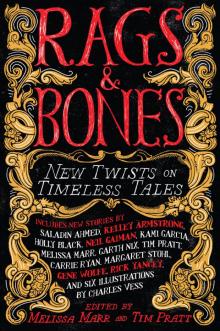 Rags & Bones
Rags & Bones Ink Exchange tf-2
Ink Exchange tf-2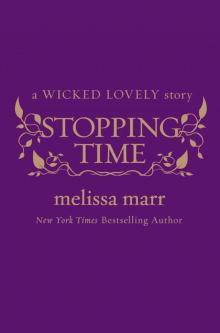 Stopping Time
Stopping Time Tales of Folk & Fey
Tales of Folk & Fey Hex on the Beach
Hex on the Beach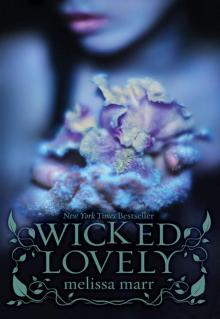 Wicked Lovely Free with Bonus Material
Wicked Lovely Free with Bonus Material Wicked Lovely tf-1
Wicked Lovely tf-1 Wicked Lovely with Bonus Material
Wicked Lovely with Bonus Material Carnival of Souls cos-1
Carnival of Souls cos-1 Radiant Shadows tf-4
Radiant Shadows tf-4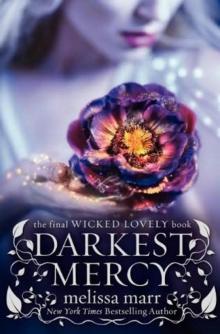 Darkest Mercy tf-5
Darkest Mercy tf-5 Carnival of Souls
Carnival of Souls Desert Tales: A Wicked Lovely Companion Novel
Desert Tales: A Wicked Lovely Companion Novel Fragile Eternity tf-3
Fragile Eternity tf-3 Old Habits
Old Habits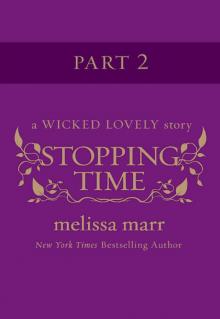 Stopping Time, Part 2
Stopping Time, Part 2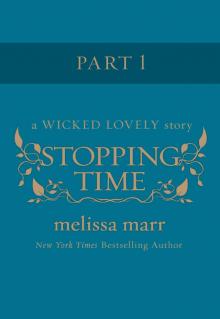 Stopping Time, Part 1
Stopping Time, Part 1